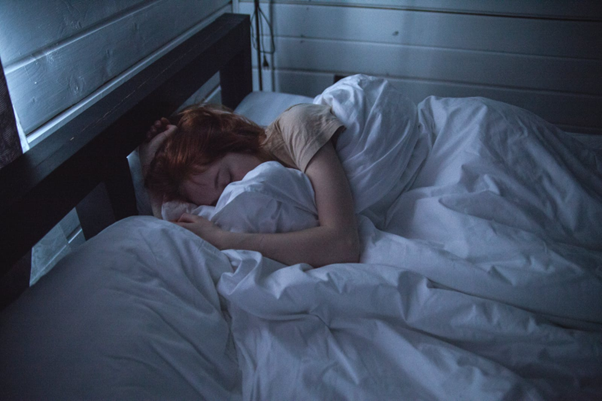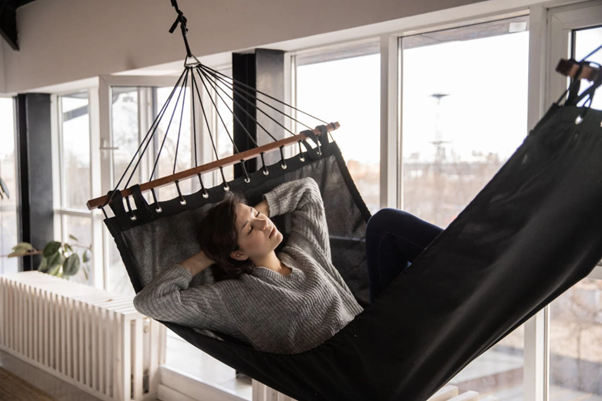Trouble falling asleep after a long day at work can be incredibly frustrating and disheartening. It’s hard to feel productive when you’re exhausted, and it can put a damper on your mood for the next day. Also, lack of sleep can have a negative impact on your health and well-being. So if you’re having trouble sleeping after work, it might be because of one of the following things:

1. Blue Light
Blue light from your computer, phone, or television can interrupt your body’s natural sleep-wake cycle. This means that even after you put those devices away, the blue light can still be interrupting your body and keeping it from getting ready to rest. According to blockbluelight.com.au, blue light suppresses the production of melatonin, a hormone responsible for making us sleepy. To combat this, try limiting screen time throughout the day and evening. If you use a device at night, consider using blue light filtering glasses or apps which reduce the amount of blue light emitted from your screens. This will help your body start to get ready for sleep
2. Caffeine Intake
Caffeine is a stimulant that can affect your sleep, even if you consume it hours before bedtime. It can take up to 6-8 hours for the effects of caffeine to wear off completely. Therefore, it’s important to limit or avoid caffeine in the late afternoon and evening to ensure a good night’s sleep. If you have difficulty sleeping after work, try avoiding caffeinated beverages such as coffee, tea, or energy drinks at least 6-8 hours prior to going to bed. Additionally, some medications contain caffeine so be sure to check their labels before consuming them.
3. Stress Levels
Our bodies are equipped with an ancient stress response system, known as the fight-or-flight response. In modern times, this can be triggered by mundane events like commuting to work in traffic or dealing with a stressful boss. High levels of stress can increase physical tension and lead to insomnia — you may find yourself wide awake when you should be asleep! If your days consist of high-stress environments and activities, it’s important to take time out for yourself during the day (or night) to reduce anxiety.
4. Exercise Regularly
Physical activity is essential for good health and well-being. It can help you sleep better, reduce stress, and even improve your mood. Exercise releases endorphins—hormones that make you feel happier—and helps regulate the hormones involved in your sleep cycle. Make sure to get at least 30 minutes of exercise per day, but not too close to bedtime as it may energize you too much! Additionally, try to stick to a regular schedule so that your body knows when it’s time for rest. This will help ensure that you have an easier time falling asleep after work each night.
5. Avoid Eating Late At Night
It’s important to give your body enough time to digest before you lay down and try to sleep. Eating late at night can lead to uncomfortable indigestion, which can disrupt your ability to fall asleep quickly or stay asleep for the duration of the night. Try not to eat anything after 8 PM if you want to give yourself the best chance of getting a good night’s rest. Eating earlier in the evening also helps avoid disrupting your circadian rhythm, as it gives your body more time to process food and prepare for sleep. Additionally, having lighter meals closer to bedtime will help keep you from feeling too full while going to bed, so focus on eating healthy snacks or a light dinner instead.
6. Have A Sleep Routine
Having a consistent sleep routine is vital in helping you fall asleep quickly and easily. Aim to go to bed around the same time each night, and try not to vary your wake-up times too much on the weekends or days off. This will help keep your body’s internal clock running smoothly and make it easier for you to drift off when it is time for bed. Additionally, limit any activities that involve bright lights before going to bed, as this can stimulate your brain and make it harder for you to relax enough to fall asleep.

If you’re having trouble sleeping after work, it might be due to one of the things mentioned above. Try limiting your caffeine intake, avoiding eating late at night, exercising regularly, and establishing a consistent sleep routine. Additionally, take breaks throughout the day if you feel overwhelmed and limit blue light exposure in the evening hours. With a bit of effort and dedication to your sleep habits, you can start getting the restful nights of sleep that your body needs.
